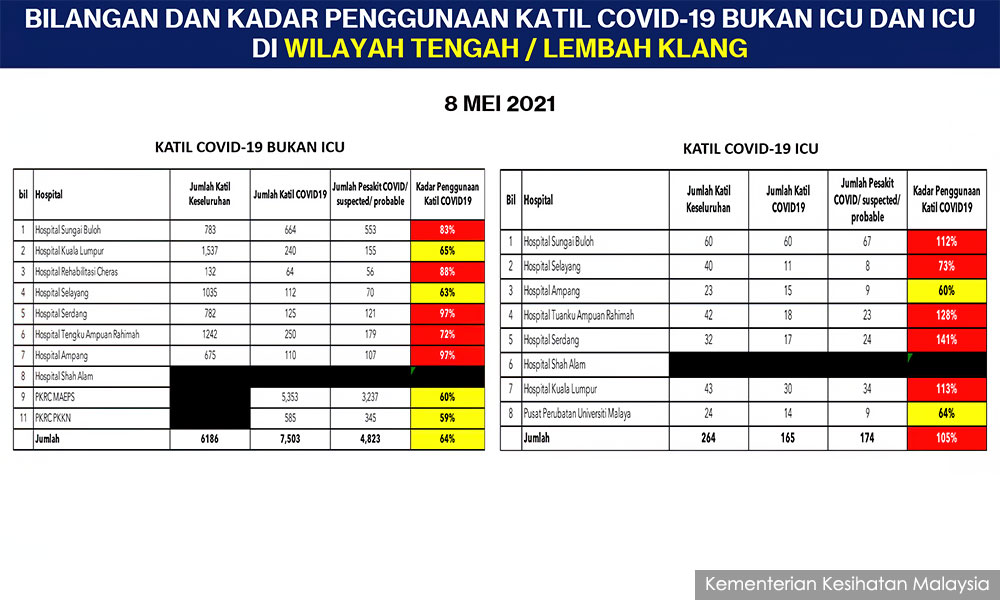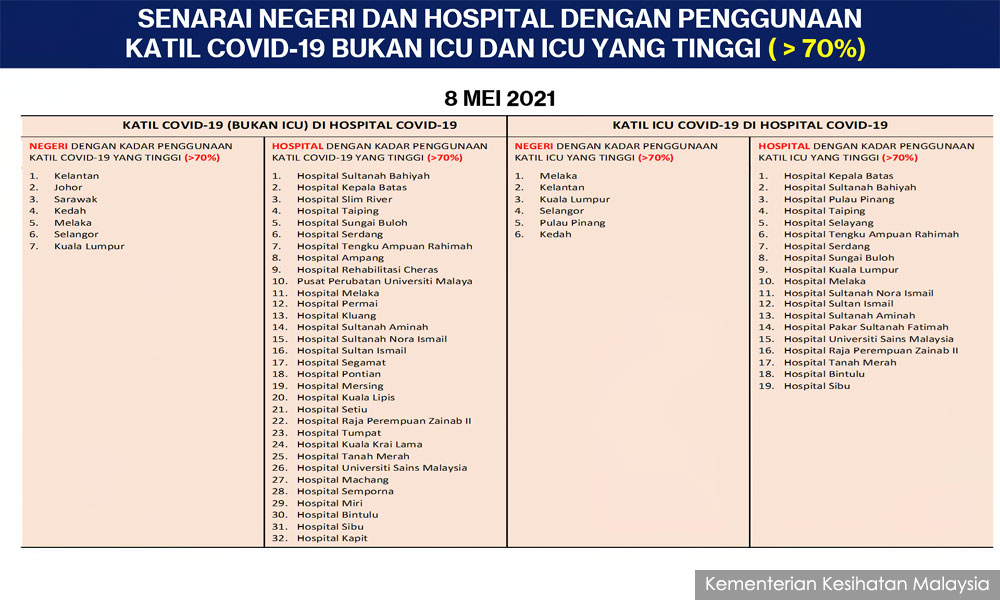COVID-19 | As Covid-19 ICU beds fill up, health director-general Dr Noor Hisham Abdullah has called for public cooperation to ensure the healthcare system does not collapse.
Speaking at his first press conference in more than two months, he presented data to show that four hospitals in the Klang Valley were already operating beyond capacity.
Nationwide, 19 public hospitals have more than 70 percent of their Covid-19 ICU beds filled.

“Public hospitals and private hospitals are running out of ICU beds and (Covid-19) beds.
“Hopefully, you can give us a period of two weeks. That will give us a buffer (to) prepare and reorganise ourselves to bring down the cases so that our hospitals can cater to patients that have been infected with Covid-19,” he advised.
Aside from ICU beds, non-ICU beds are also filling up.
As of May 8, Hospital Ampang had just three Covid-19 beds left while Hospital Selayang had only four beds remaining.
Nationwide, 32 public hospitals have more than 70 percent of their non-ICU Covid-19 beds filled.
Seven states and territories have a more than 70 percent Covid-19 bed occupancy rate - Johor (92 percent), Malacca (90 percent), Kelantan (84 percent), Sarawak (83 percent), Selangor (82 percent), Kuala Lumpur (72 percent) and Kedah (72 percent).

Malaysia is seeing an all-time high in Covid-19 ICU and ventilated patients. These represent the most severe and possibly fatal Covid-19 cases.
Yesterday, Noor Hisham said a total of 506 confirmed, probable and suspected Covid-19 patients were in intensive care.
“If you are infected and come to the hospital and we do not have ICU beds, then we are in trouble.
“We do not want to be like countries (where) we have to select who will live and who will die,” the top official warned today.
Younger patients, community infections
When asked why hospitals were seeing a spike in Covid-19 ICU cases, Noor Hisham attributed it to a rise in younger patients who appeared to be more resistant to treatment.
“Apart from the elderly and those with comorbidities, the younger population is also using the ICU. The severity of these cases and their resistance to treatment like steroids are much higher,” he said.
Based on cases in the first five months of this year, the ministry calculated that people aged between 20 and 49 were now more likely to be infected with Covid-19 than any other age group.
Aside from these younger patients, Noor Hisham also noted that sporadic Covid-19 cases were on the rise. Sporadic cases are infections possibly acquired in the community rather than from clusters.
This, he said, had further contributed to the ICU cases spike.
“Because community infections are high, vulnerable populations like the elderly as well as those with comorbidities get infected. (Maybe) from their children who came home bringing the infection to the family,” he said.
Surgeries stopped for Covid-19
Meanwhile, Noor Hisham confirmed that he had instructed all surgical operations and elective procedures at public hospitals to be halted.
This was communicated in a directive dated May 7.
“The postponement will allow more hospital beds to be distributed to Covid-19 patients and (turned into) ICU beds. This postponement will also allow all clinical staff to be mobilised to help treat Covid-19 cases including ICU cases.
“The state health director can decide when to resume surgeries and elective procedures in stages,” it read.
The directive also included the following instructions:
- Hybrid Covid-19 hospitals to allocate more beds for Covid-19 cases
- All clinical and non-clinical staff need to mobilised to help in Covid-19 and Covid-19 ICU wards
- Hospitals to repurpose wards and spaces into Covid-19 ICU wards.



No comments:
Post a Comment
Note: Only a member of this blog may post a comment.